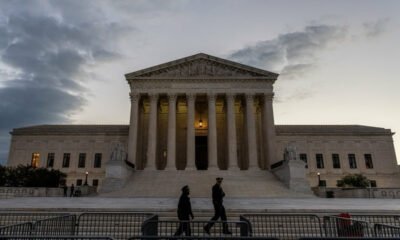border
Attorney Claims Walmart Shooter Thought He Was Executing Trump’s Vision During El Paso Assault

Patrick Crusius, the gunman behind the notorious 2019 El Paso Walmart shooting, believed he was acting under the direction of then-President Donald Trump. His defense attorney, Joe Spencer, revealed that Crusius viewed his violent actions as a necessary step to combat what he perceived as “the Hispanic invasion of Texas.” Spencer stated, “He thought he had to stop the invasion because that’s what his president was telling him.” This rationalization highlights a troubling intersection of mental health and extremist beliefs.
Just days after the shooting, Trump condemned the act and its roots in racism, saying, “Hate has no place in America.” Despite this, he visited El Paso shortly after the incident, ignoring the objections of local leaders who linked his inflammatory rhetoric to the tragedy. Critics have long argued that Trump’s anti-immigration sentiments may have influenced Crusius’s actions, although until now, his defense team had not publicly acknowledged this connection.
Crusius, who is set to plead guilty to capital murder and aggravated assault charges, faces a life sentence without parole. He had already received 90 consecutive life terms for federal hate crime charges. Spencer’s relative silence in the media stemmed from court-imposed restrictions, but recently, a gag order was lifted, allowing for a more in-depth discussion about Crusius’s mental health. Spencer described Crusius as having a “broken brain,” emphasizing his longstanding struggles with schizoaffective disorder.
According to Spencer, a significant moment for Crusius came during a 2019 Trump rally in Florida, where the president’s rhetoric about border security resonated deeply with him. Video footage showed Trump brushing off a crowd member’s call to “shoot them,” a comment that seemed to reinforce Crusius’s extremist beliefs. After witnessing this, Crusius purchased a semiautomatic rifle and traveled to El Paso to carry out the attack.
The manifesto Crusius released prior to the shooting denied any influence from Trump, asserting that he would be unfairly blamed by the media. However, Spencer indicated that Crusius’s writings largely consisted of copied text from various sources. When questioned about Trump’s influence, Crusius reportedly showed discomfort, highlighting a reluctance to confront the ramifications of his beliefs.
Experts in psychology and extremism note that rhetoric from authority figures can desensitize and dehumanize, pushing isolated individuals toward violent acts. Christine Reyna, a psychologist focused on white nationalism, pointed out that such language, increasingly prevalent in conservative circles, may inspire further acts of violence against marginalized communities. She emphasized that the linking of immigration with existential threats only exacerbates this risk.
Reyna’s research underscores a troubling trend whereby figures like Crusius become heroes among extremist groups, motivating others to imitate their actions. The normalization of anti-immigrant rhetoric has dangerously shifted to mainstream discourse, which could lead to increased violence. As society grapples with these realities, it remains critical to assess the implications of political speech on vulnerable individuals.

















